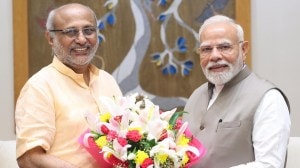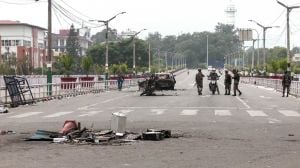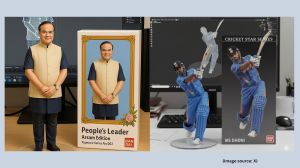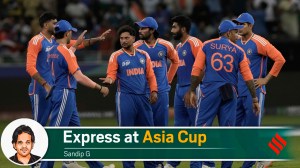‘If I had played on, Irfan, Balaji wouldn’t have got breaks; if they hadn’t come good, people would’ve said I quit too early’
• Look at yourself; you look so fit and ready to go. Who let you retire at this age and with this kind of fitness?It was a very hard de...

• Look at yourself; you look so fit and ready to go. Who let you retire at this age and with this kind of fitness?
It was a very hard decision to make. I knew that it had to come to an end. I was conscious of a few factors. I started thinking about retirement from 2001. And then I realised that the World Cup would be a great platform for me. It would have been a really great platform for retirement if we had won the World Cup final match. But we didn’t, and finally I had to call it off.
• But you didn’t have to retire. Why the decision? It’s a question a lot of your teammates also asked.
Like I said, there are a lot of factors. Thirteen years of international cricket had taken their toll on my body. The motivation factor was also important. So even if I had played another year of cricket, it would have been the Australia series.
• Wasn’t beating Pakistan in Pakistan motivation enough?
Any series is a big motivation for you to play. When you’re playing for the country, any game is as big as the other. You can’t really differentiate between Pakistan or Australia or England or…
• When the decision to go to Pakistan was taken, did you feel tempted? Or did you wish you were a bit younger?
Even today, when I watch the games, I feel I should have been there. But that feeling will be there as long as I last, you have to live with it for the rest of your life.
• Do you regret not having gone to Pakistan? Certainly you would have got wickets; India was winning….
Yeah, when the team wins, that’s what you miss the most. The great dressing room environment. It’s great to be part of the dressing room when the team wins. I think anyone who has played a bit of cricket would want to be part of that environment in the dressing room.
• Because you have these very young fast bowlers and all of them — Agarkar, Nehra, Zaheer — have had injuries. They could have done with your company. Or do you think they would have felt overshadowed?
There are two ways of looking at it. One is that if I had played cricket for one more year, I don’t think Irfan or Balaji would have played cricket. Because it is important for them to get the right breaks. At the same time, had they not really blossomed, some people would have said that Srinath probably gave in a little early. I think the guys have done really well, I have no regrets at all.
• So are you trying to give these youngsters the early start that you were denied?
In a way, yes. I think my crucial first three years were spent sitting in the dressing room. But I learnt a lot from that. The team requirement was such that I didn’t find a place in the starting XI.
• You were also playing that much more in India.
Exactly. From 1993 to 1995, we seldom toured abroad. When abroad, I figured in most of the games. But it wasn’t so when we played in India. You learn all the time in your formative years and that’s where I think I was delayed. I feel Test cricket is where you learn the most and I missed out on 13 to 14 Tests in the initial stage of my career.
• Was it frustrating at times?
Personally it was. But from the team’s point of view, we won most of the games through that period. We had a golden period in those three years.
• Imran Khan once told me that ‘Javagal Srinath is the world’s most talented, underrated, unfairly-treated fast bowler ever’.
Well, I was a big fan of Imran Khan. Well, any of the Pakistan fast bowlers, be it Wasim Akram or Waqar Younis. I have been a great fan of these three guys whose strike rates are tremendous on sub-continent wickets.
• Well, Imran said ‘you are making him bowl 30 overs a day; you give him lousy slips; you give him lousy wickets; and you don’t give him a bowler at the other end’!
We had similar skills actually, me and Imran, because we both used to bring the ball back in to the right-hander. It’s true that I sometimes used to open the innings on my own. Sourav Ganguly used to share the new ball. So that shows what the Indian system thought of about fast bowlers at that point of time. Which was very disappointing. I would say it was a very unstable period for fast bowlers in India. I think I played with 23 fast bowlers in my career. Which is a staggering number. Which shows that fast bowlers couldn’t really work as a team. That’s where I missed out a lot.
• In fact, if you want to win Test matches over a season, use three or four.
Exactly. Fast bowlers need to collaborate to do well. Fast bowlers can make a difference because they are going to win you a match. That’s what I see now and that’s what I expect from the four fast bowlers we have at the moment: Ashish, Zaheer, Irfan and Balaji. I think they are great fast bowlers. And we have Ajit in the side as well.
• Would you call this crop our best fast bowling attack ever? Or potentially the best ever?
I think this is the best fast bowling quartet and also the best team. The team is really important when you fix the jigsaw puzzle and that’s where the fast bowlers come in.
• One image that is fixed in our minds is that of Srinath coming in to bowl and someone dropping it in the slips and Srinath expressing his anger or disappointment. Less of that happens now of course….
Over the last four years a lot of things happened…. The fielding has changed. John Wright has done a great job with the fielding aspect of it. I think the guys have really changed their attitude towards the game. We have learnt quite a lot from the better teams. Now I think they are one of the top teams of the world.
• You know, you said after you retired that one of the high points of your career was beating Pakistan in every World Cup.
I think playing Pakistan is always a big game because expectations start building from every fraternity of the country. Everybody expects quite a lot from you. Imagine the World Cup then. It is going to be a big pressure situation. And on all four occasions we have beaten Pakistan.
• Yet at a personal level, Indian and Pakistani cricketers have had a very good relationship.
Yes. I have shared very good relationships with Wasim and Waqar. In 1994, Waqar and I were chatting and he gave me a pair of shoes from Pakistan to try out. We have a great relationship. When we lose they also realise the pressure of the situation. And that sometimes the reaction of the people could be really bad.
• Tell me, what changes did you bring into your bowling? You became a more productive bowler in the second part of your career.
Probably just the experience. I used to speak a lot to people and I learnt a lot from the great fast bowlers. Dennis (Lillee) was a great help. This is how you grow and your responsibility towards the team also grows. I started leading the attack in 1995-96, became the strike bowler. That makes you take more responsibilities.
• But you would have benefited a lot from having a bowling coach in the side.
Definitely. If the same thought had been applied to the side ten years back, I think my bowling would have been much better. I always believed that the Indian team needed a bowling coach. Because it is always from the batsman’s perspective. Except for the short time when Kapil Dev and Madan Lal were coach, we have always had batsmen. So we have never had any ideas to share with the coach. You had to be on your own. An internationally experienced guy would help.
• The current team then requires a regular, consistent bowling coach?
I think so. I very much think so. These guys are learning fast and at the first stage of their cricketing careers they have done really well. Now they have to sustain it. People around the world now know what these guys bowl. This is the time when they have to believe in their achievements….
• How do you rate them? Individually. What are their strong points and weaknesses?
I think Zaheer is probably still our number one bowler. It’s unfortunate that he’s had so many injuries. Irfan has shown signs of becoming the Wasim Akram of the future and him being a left-hander is probably the biggest gain for India.
• Also that he is so young….
Yes. But I would be a bit apprehensive talking about these guys too much. Because I really want them to succeed. What happens in India is that you are taken to a new level very suddenly and a lot of pressure mounts on the player. A couple of bad games can really pin you down. Sustenance is important for these guys.
• Would you say Balaji is the biggest surprise of the pack?
He is a real hard worker, I would say the dark horse. He has shown a great attitude. And the tenacity to stay in international cricket.
• He sometimes reminds me of Venkatesh Prasad. He can also bowl that leg-cutter at will.
Yes, he has a bit of everything. I met him at the MRF Pace Foundation recently. He looked very keen and wanted to understand more about fast bowling. That’s probably the most important thing.
• Is that the job you would want: the bowling coach of the Indian team?
If it comes along, it will be an honour for me. But it’s not something I am hell-bent upon. I am looking at other options.
• You don’t have to be hell-bent, but is it a job you want?
If it falls in place, yes.
• Has the Board raised it with you at any point?
No, no, nothing. Nothing has been discussed about it so far.
• If it comes along, would you take it up as a commitment, a long-term commitment? Or as a part-time thing?
A coach means you have to be with the team for some time. You have to work with the boys, understand everyone’s mentality and how tough they are. Keep talking about different situations and other things, training methods, skills….
• Tell me, if you were the coach, what would you tell these four to do in the first week?
The first week will probably just be settling down with the boys. There’s not much… It’s a long process. You can’t really quantify your work on a week-by-week basis. I think it’s more about how you work with the boys at the crucial moments.
• You have played under four captains. How would you rate them?
Everybody has their plusses and minusses. It’s only fair that I talk about their plus points. Azhar left everybody to themselves. He believed that when you play for India you are responsible enough to do your own things.
• He was often accused of being too detached.
That’s the other side of the same thing. Sachin is somebody who expects a lot from the boys. He can perform at that level. He can bowl like a good leg-spinner, he can bowl like a good off-spinner, he can swing like a good medium-pacer, and he can bat like Sachin Tendulkar. So his expectation levels were very high and a lot of us failed to match that. And he appeared a little aggressive. When he came back for the second tenure, he was more mature and he understood the problems and the limitations of each and every player.
• You got injured around that time as well.
Yeah, I was injured around 1996-1997. And the team was more of a group then. It is more like a real team now.
• How do you make that distinction?
There were a lot of people coming in and going out. That’s probably the biggest problem a captain has. When you don’t have a proper combination of fast bowlers, when you don’t have a proper combination of spinners, when you don’t have regular batsmen who know their jobs.
• But is the team performing better now also because they are training more scientifically and there’s more accountability?
Yeah. I think the system by which the team is playing now has brought in greater accountability. I think that gives you a vision of what you are doing. It is easy to talk about it, but…
• The other interesting thing about you is that you were our fastest bowler for a long time but you were also a most genial man. The couple of times you hit batsmen, you were so apologetic. That’s so unlike a fast bowler.
That’s true. I think my way of being aggressive was different. I would never abuse a batsman. That was not my thing. Sometimes the word ‘aggression’ is a bit exaggerated.
• We have gone through so much of this conversation without talking about the one thing you really valued: your batting. You spent a lot of time in the nets.
It’s true. I was really keen to bat well. The interest I had was accentuated when I was promoted to number three. But after I got a couple of fractures in my fingers I realised that I can’t bowl. Now, I am there to bowl. Not to bat. There is a strategy now to target the knuckles of the fast bowlers. In doing that, I realised that there is no point in my scoring 20 runs and then not being able to bowl.
• And we figured that a bit late; that this was a conscious plan on the part of the opposition.
I think so. I fractured it four times in the last four-five years. And I missed a great deal of cricket because of these fractures, which were a nuisance for my career. Then I decided that I should throw my bat around a bit and concentrate more on my bowling.
• So Srinath, at this young age and this level of fitness, where do we see you going?
I work with Indian Airlines. I have resumed my work with them. It’s not easy…there’s a sense of loss when you give up this profession. I have been working with the MRF Pace Foundation. They are trying to bring in new things and explain what fast bowling is all about to young aspirants.
• And do you find more talent now? Has fast bowling become sexier?
It has really picked up. A lot of credit for that should go to the new fast bowlers. They have really helped because we were really short of fast bowling heroes in this country. Irfan and Balaji and Zaheer and Ashish have really brought in this interest in the minds of youngsters. I see a good future for fast bowlers in India.
Photos



- 01
- 02
- 03
- 04
- 05



























